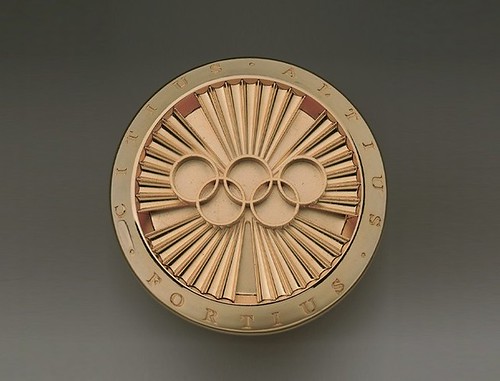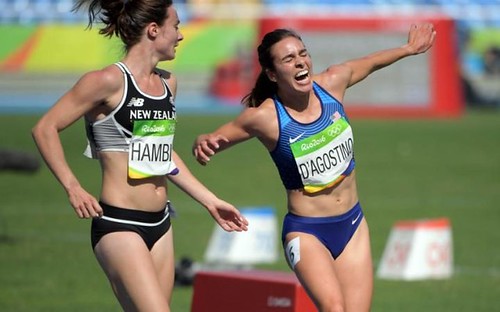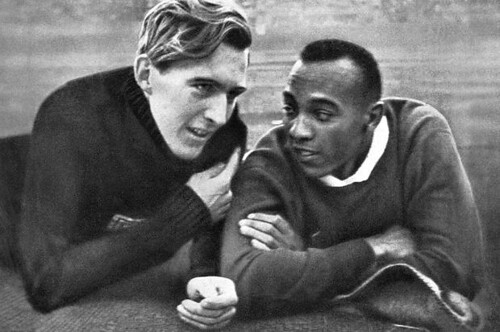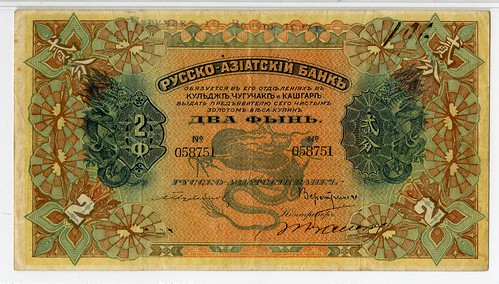
PREV ARTICLE
NEXT ARTICLE
FULL ISSUE
PREV FULL ISSUE
THE PIERRE DE COUBERTIN OLYMPIC MEDAL
What's the rarest Olympic medal? Not the bronze, silver, or even gold. -Editor
It goes without saying that if you're an Olympian, you've already accomplished an incredible feat. One medal that doesn't always get the attention it deserves, though, is the mysterious Pierre de Coubertin medal. But what is the Pierre de Coubertin Olympic medal, anyway? When was the last time someone got one, and why don't I hear more about this mysterious Olympic prize? Whether or not you bring home a medal from the Olympics, you've gained universal respect for your athleticism, hard work, and dedication just by getting there in the first place — but only select few will walk away with a Pierre de Coubertin medal. Before we get into the specifics of the Pierre de Coubertin medal itself, it's worth reviewing who Pierre de Coubertin actually is. Coubertin was the founder of the International Olympics Committee (IOC) and is widely considered to be the father of the Olympic Games as we know them today. Though the first modern Olympics were held in 1896, by 1906, they were considered to be the most prestigious athletic games in the world, largely due to Coubertin's vision and mission for the competition. Interestingly, Coubertin was also the first person to introduce the modern pentathlon into the Olympics in the year 1912. Coubertin's vision for the Olympics stressed an international community where athletes come come together and represent their countries with pride, creating unity among all corners of the world. It's no surprise, then, that the award named after him values sportsmanship above athleticism. Here's the lowdown on this special award: The Pierre de Coubertin medal honors athletes who exemplify good sportsmanship. According to Cosmopolitan, it can also be awarded to athletes who display an "exemplary" service to the Games. It was inaugurated in 1964, so it's still a relatively recent part of the Olympics. Is It Awarded At Every Olympics? No. In fact, the Pierre de Coubertin medal is awarded by the IOC so rarely, it's only been given out 17 times. While many people are speculating that a Pierre de Coubertin could be awarded at the Rio 2016 Olympics to various athletes, none have been presented with it yet. To read the complete article, see:
Here's what one looks like. -Editor

To read the complete article, see:
In case you missed it, two women did win the medal at this year's Rio Olympics. -Editor

The athletes who captured the essence of the Olympic spirit in acts of selfless kindness have been rewarded for their show of sportsmanship. New Zealand's Nikki Hamblin's stopped to assist Abbey D’Agostino after the American athlete fell in agony. Earlier in their 5,000m race, D'Agostino had herself helped Hamblin to her feet after a fall that tripped them both. Hamblin's admirable compassion for her fellow athlete drew plaudits from around the world as the 28-year-old athlete gave up on a chance of a medal to help the stricken runner. D'Agostino urged to Hamblin to continue racing but the English-born athlete refused to leave the American's side until a wheelchair could be brought to take her away. Now the IOC has decided to award both the New Zealander and the American the prestigious Pierre de Coubertin award. Otherwise known as the International Fair Play Trophy, the award has only been handed out 17 times in Olympic history. Named after the founder of the International Olympic Committee, the award is reserved for athletes, volunteers or officials who have demonstrated the Olympic sprit. "Winning this award is overwhelming," said Hamblin. "I am proud that what we did and truly believe that you can be both a competitor and kind and responsive at the same time. "Everyone comes here to compete but there are a lot of people who don’t achieve that and the journey is really important too. That was one of those journeys and it has gone on to be one of the most important moments of my life." The award was presented to the athletes in a ceremony held at The Olympic Club. To read the complete article, see:
Here are some past winners. -Editor
1. LAWRENCE LEMIEUX, 1988 Canadian sailor Lawrence Lemieux was in second place during the Finn class competition at the 1988 Olympics in Seoul, South Korea, when he saw a pair of Singaporean sailors in a nearby race capsize. Realizing they were in danger of being carried out to sea, Lemieux abandoned his race and went to help. After pulling both of the capsized sailors onto his boat, Lemieux waited for more help to arrive before getting back to his own race. Though he eventually finished 11th, he was credited with a second-place finish and awarded the de Coubertin medal. 2. EUGENIO MONTI, 1964 During the 1964 Winter Games in Innsbruck, Austria, celebrated Italian bobsledder Eugenio Monti heard that the British team, Tony Nash and Robin Dixon, had sheared a key bolt from their bobsled. After his run was complete, Monti offered his rivals a bolt from his own sled—and the Brits ended up winning the gold. (Monti and his teammate came in third.) When he was later asked if he regretted sharing the hardware, Monti replied, "Nash didn’t win the gold medal because I gave him a bolt. He won because he was the fastest." Though he received the de Coubertin medal, Monti was probably also pretty happy about taking home his own pair of golds four years later at the 1968 Games. 3. VANDERLEI CORDEIRO DE LIMA, 2004 At the 2004 Summer Games in Athens, Brazilian runner Vanderlei Cordeiro de Lima was leading the men's marathon with just four miles to go. Then it happened: A defrocked Irish priest jumped out of the crowd and detained de Lima for a good seven seconds. Though the delay was brief, it may have cost the athlete a higher finishing spot; he missed gold by more than a minute and silver by more than 40 seconds, but it's hard to say how he would have performed in the last few miles had his concentration not been interrupted. The IOC refused to change the result of the race, but they did give the Brazilian runner the de Coubertin medal in addition to his bronze. Even now, more than a decade later, the recognition continues: de Lima was chosen to light the Olympic cauldron in Rio this year. 4. LUZ LONG, 1936 
Luz Long, a German long jumper, gave American Jesse Owens a tip about where to start after the American athlete had failed two qualifying jumps. "He helped me measure a foot back of the takeoff board—and then I came down and I hit between these two marks. And therefore I qualified," Owens said in a 1964 documentary. "And that led to the victory in the running broad jump." Long, who was killed in action during World War II, was posthumously awarded the sportsmanship medal for his act—although many believe that the story was completely made up. 5. SHAUL LADANY, 2007 Self-trained Israeli race walker Shaul Ladany has never medalled at the Olympics, but his perseverance and character count for a lot more. As an eight-year-old, Ladany survived the Bergen-Belsen concentration camp. As if that weren't enough horror for a lifetime, he also survived the Munich Massacre at the 1972 Olympics, even though one newspaper report listed him as a fatality. Perhaps it was his brushes with death that spurred Ladany to achieve so much in life. In addition to his impressive athletic feats (one race walking World Championship win and several gold medals in the Maccabiah Games), Ladany speaks nine languages, holds eight patents, has written more than 100 scholarly papers and a dozen books, and is a professor of industrial engineering. In 2007, he added "Pierre de Coubertin Medal Winner" to his long list of accomplishments when the IOC honored him for "outstanding services to the Olympic Movement." To read the complete article, see:

Archives International Auctions, Sale 35 Chinese, Asian & Worldwide Banknotes, Chinese Scripophily, Coins and Security Printing Ephemera September 26, 2016 
Click the links! Highlights include: Lot 49: Lot 49 British North Borneo Company Lot 74: Ming Dynasty Circulating Note Lot 172: Lot 172 Russo-Asiatic Bank, 1913-1917 Lot 174: Sino-Belgian Bank, 1908-1912 Mexican Dollar Lot 272: Banco Nacional 1899 Provisional Issues Lot 307: National Bank of the Danish West Indies 1905 Specimen Lot 356: Ethiopia 500 Thalers 1932 High Grade rarity View the Virtual Catalog Download the Catalog in PDF format ARCHIVES INTERNATIONAL AUCTIONS, LLC 1580 Lemoine Avenue, Suite #7 Fort Lee, NJ 07024 Phone: 201-944-4800 Email: info@archivesinternational.com WWW.ARCHIVESINTERNATIONAL.COM Wayne Homren, Editor The Numismatic Bibliomania Society is a non-profit organization promoting numismatic literature. See our web site at coinbooks.org. To submit items for publication in The E-Sylum, write to the Editor at this address: whomren@gmail.com To subscribe go to: https://my.binhost.com/lists/listinfo/esylum All Rights Reserved. NBS Home Page Contact the NBS webmaster 
|